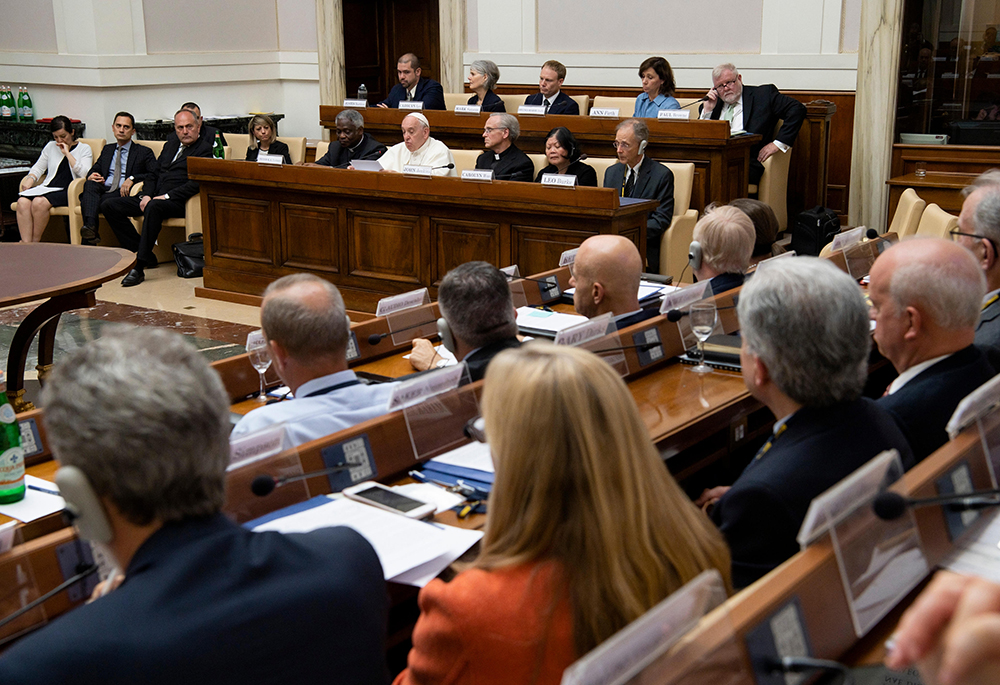
Pope Francis speaks June 14, 2019, to executives of leading energy companies meeting at the Vatican to discuss mitigating the effects of climate change. The pope is seated between Cardinal Peter Turkson, then-president of the Dicastery for Promoting Integral Human Development, and Holy Cross Fr. John Jenkins, president of the University of Notre Dame, co-sponsors of the meeting. (CNS/Vatican Media)
Catholics in the United States join the rest of the nation in strongly backing actions to reduce the impacts of climate change, but they're also more supportive of expanding coal mining, fracking and offshore drilling than other Americans, even as Pope Francis has continually urged the world to bring an end to the era of fossil fuels.
The findings were part of a new wide-ranging survey by Pew Research Center on Americans' views on national policies and actions in response to climate change. Conducted May 30 through June 4 among 10,329 U.S. adults, including 2,002 Catholics, it comes as dangerous summer heat waves hit much of the country and smoke from Canadian wildfires blanket city skies and plummet air quality.
The survey was released nearly a year since President Joe Biden signed into law the nation's largest-ever investment to address climate change through the Inflation Reduction Act. That landmark legislation contains $369 billion in tax incentives and programs to accelerate the shift from fossil fuels to renewable power sources, including electrifying homes and businesses, expanding electric vehicles, and significant investments in clean energy technologies and environmental justice initiatives.
Two-thirds of American adults surveyed said they support prioritizing development of alternative energy sources, like solar, wind and hydrogen, over continuing to increase production of coal, oil and gas. While a clear majority, it represents a 12 percentage point drop from May 2020.
At the same time, Americans expressed hesitancy about fully abandoning fossil fuels. While 31% supported a full phaseout, 32% believed the U.S. should do so eventually, but not right now. And 35% said the country should never stop using fossil fuels.
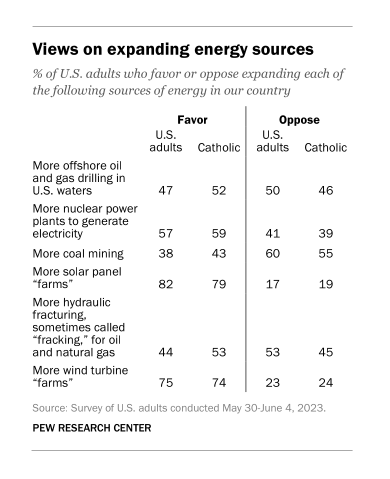
Views on expanding energy sources are shown in this table of survey results from Pew Research Center. (Pew Research Center)
Support for fully phasing out fossil fuels was notably lower among Catholics, with just 22% endorsing such a shift. Three in four Catholics said the country should use a mix of renewables and fossil fuels, compared to two-thirds of U.S. adults overall.
Large majorities of both U.S. adults (82%) and U.S. Catholics (79%) favor expanding solar energy and wind power (75%, 74%), with nearly six in 10 of each agreeable to more nuclear power plants.
But Catholics were more open to expanding fossil fuel production than the rest of the country, including offshore oil and gas drilling in coastal waters (52% support for Catholics, 47% for U.S. adults), coal mining (43%, 38%) and hydraulic fracturing, or fracking, for oil and gas (53%, 44%).
The heat-trapping emissions released from burning fossil fuels are the primary driver of climate change. Climate scientists have stated a narrow pathway remains to limit global warming to 1.5 degrees Celsius — considered a threshold of heating that puts millions fewer people at risk of droughts, heat waves and extreme weather — but it will require rapid action this decade.
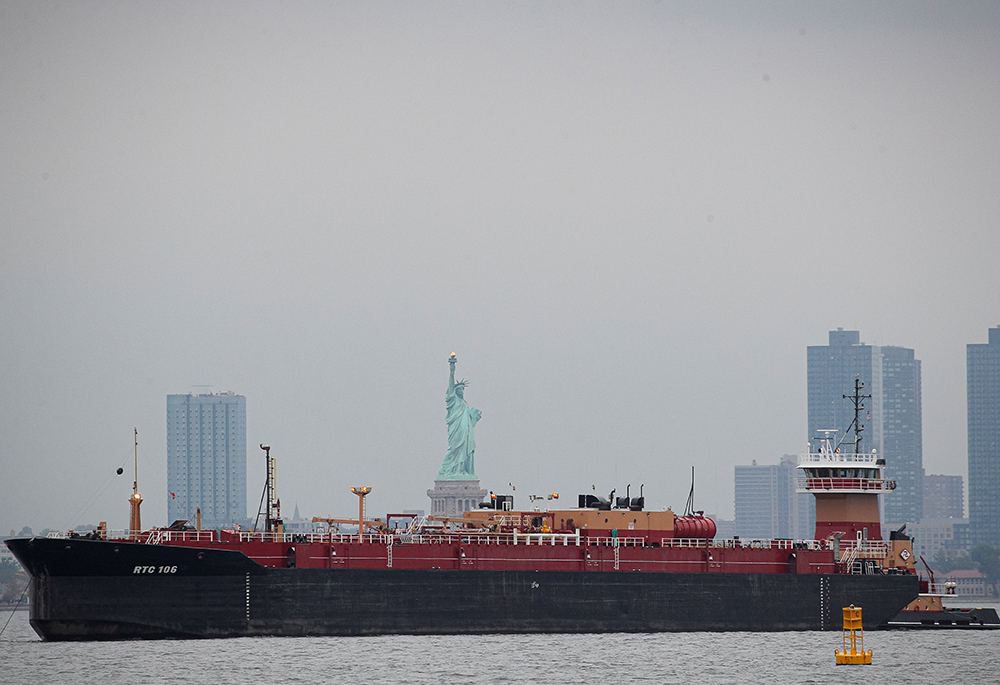
A tugboat in New York City pushes a fuel oil barge past the Statue of Liberty Oct 13, 2021. (CNS/Reuters/Brendan McDermid)
In an March report, the United Nations Intergovernmental Panel on Climate Change reiterated that countries need to cut greenhouse gas emissions roughly in half in the next seven years and reach net-zero emissions by 2050 in order to hold average temperature rise to 1.5 C, a primary goal in the 2015 Paris Agreement.
The historic climate accord now includes nearly every nation on Earth, including the Holy See, which officially joined last year.
In his 10 years as head of the Roman Catholic Church, Pope Francis has spoken frequently and forcefully, including in his 2015 encyclical "Laudato Si', on Care for Our Common Home," about the need for nations to move away from fossil fuels and toward cleaner sources of power for social and economic development.
In his message for this year's World Day of Prayer for the Care of Creation, Sept. 1, Francis called for a rapid end to "the fossil fuel era," saying it is "madness to permit continued exploration and expansion of fossil fuel infrastructure."
Francis also delivered that message directly to the CEOs of major oil and gas companies during several face-to-face meetings. And the Vatican has championed a just transition to renewable energy at international climate summits, and within the church through its Laudato Si' Action Platform, which includes among its goals for Catholic institutions achieving carbon neutrality and redirecting investments from fossil fuels toward clean energy.
Jose Aguto, executive director of Catholic Climate Covenant, said he was surprised to see Catholics in the survey favoring fossil fuel expansion more than the general population. He told EarthBeat it highlighted the need for increasing ecological education — another of the Laudato Si' Action Platform's goals — especially around the harmful impacts to health and ecosystems from fossil fuel extraction and its byproducts, whether mercury pollution, PFAS or "forever chemicals," or methane leaks.
"We need to do a better job of educating on why expansion of these particular energy sources isn't that great for us," Aguto said.
The survey showed Catholics split on the impact of environmental laws and regulations generally, with a slight majority (51%) holding the view they cost too many jobs and hurt the economy, compared to 48% who viewed them as worth the cost. U.S. adults overall largely flipped those percentages, with 53% seeing environmental regulations as worth the cost compared to 45% concerned with economic losses.
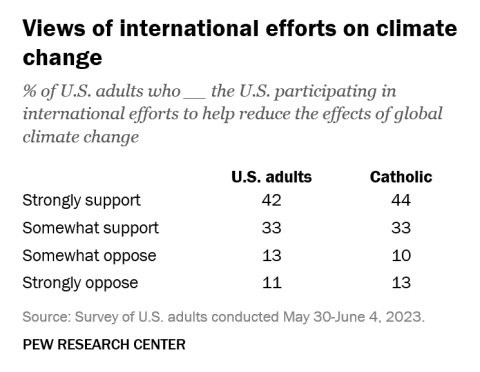
Views of international efforts on climate change are shown in this table of survey results from Pew Research Center. (Pew Research Center)
Still, three in four U.S Catholics, like U.S. adults overall, endorse U.S. participation in international efforts to limit the impacts of climate change, like more intense storms, prolonged droughts and heat waves, and more damaging floods and wildfires. But 54% of Americans are not optimistic that countries will do enough to avoid the "worst impacts" of climate change, compared to 33% who are more hopeful.
Aguto said it was "very encouraging" that 77% of Catholics support international cooperation on climate change, and that a majority of U.S. adults showed awareness of environmental health impacts in their own communities, including too much trash (59%), polluted waters (54%), air pollution (51%) and lack of green space (38%). In each case, lower-income adults were more likely to identify local environmental problems.
Advertisement
That increasing sensitivity to issues of environmental justice "all points in a very positive direction, where we're starting to hit some of Pope Francis' desires," he said. "We are understanding that we are all interrelated and that this is all God's creation."
Biden has pledged under the Paris Agreement that the U.S. — the second largest present-day emitter and leading historical source of greenhouse gases — will reduce its emissions by 50-52% from 2005 levels by 2030.
The bulk of that commitment is contained in the Inflation Reduction Act's climate provisions, which alone projects to reduce U.S. emissions by 40% by 2030 and remove 1 billion metric tons of emissions.
While the act includes tax incentives to spur wider adoption of electric vehicles and home energy upgrades like solar panels, heat pumps and efficiency improvements, the Pew survey found Americans are not yet plugged in.
Half of U.S. adults said they are not likely to seriously consider an electric vehicle for their next vehicle purchase, compared to 38% who would be somewhat or very likely to do so.
Fifty-nine percent of Americans said they are opposed to, compared to 40% in support of, phasing out gasoline-powered cars and trucks by 2035. Many of the major automakers have announced goals to stop producing internal combustion engine vehicles within the next 17 years. Americans are twice as likely to be upset (45%) rather than excited (21%) by such a move.
About three in 10 American homeowners said they have seriously considered installing solar panels at home. Seven percent said they have explored switching a gas stove to an electric or induction model, and 11% have looked at installing an electric heat pump system or an electric water heater.
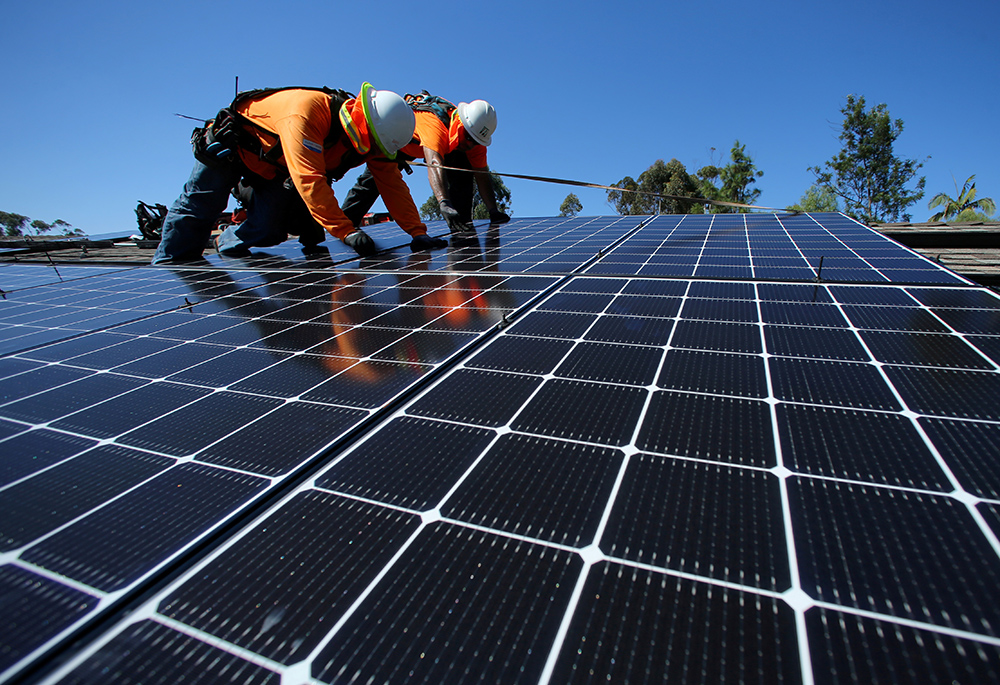
Solar installers are seen on a residential home Oct. 14, 2016, in Scripps Ranch, California. (CNS/Reuters/Mike Blake)
On other climate solutions, planting 1 trillion trees to absorb carbon emissions has near universal support (89%). Most Americans also favor requiring oil and gas companies to seal methane leaks from oil wells (85%), providing businesses tax credits for carbon capture and storage technologies (76%), taxing corporations for their carbon emissions (70%), and requiring power plants to eliminate carbon emissions by 2040 (61%). But 51% oppose requiring new buildings to run only on electricity.
Overall, Americans are optimistic and also worried about what a transition to clean energy will mean. Fifty-nine percent think less fossil fuels will mean cleaner air and water, and just under half expect it will provide more energy jobs.
Still, 72% of Americans say it's very or somewhat likely that unexpected problems would arise during an energy transition. There were close splits on whether they believe prices to heat and cool homes will increase or decrease (42%, 37%), whether prices for everyday goods will get worse or better (44%, 25%), and whether the electrical grid will be more or less reliable or the same (32%, 38%, 29%).
The costs of clean energy have plummeted over the past decade, with solar and wind now cheaper to deploy than operating coal-fired power plants. And numerous studies have found renewable energy as the cheapest source of power today and that it helps people save on home energy costs.
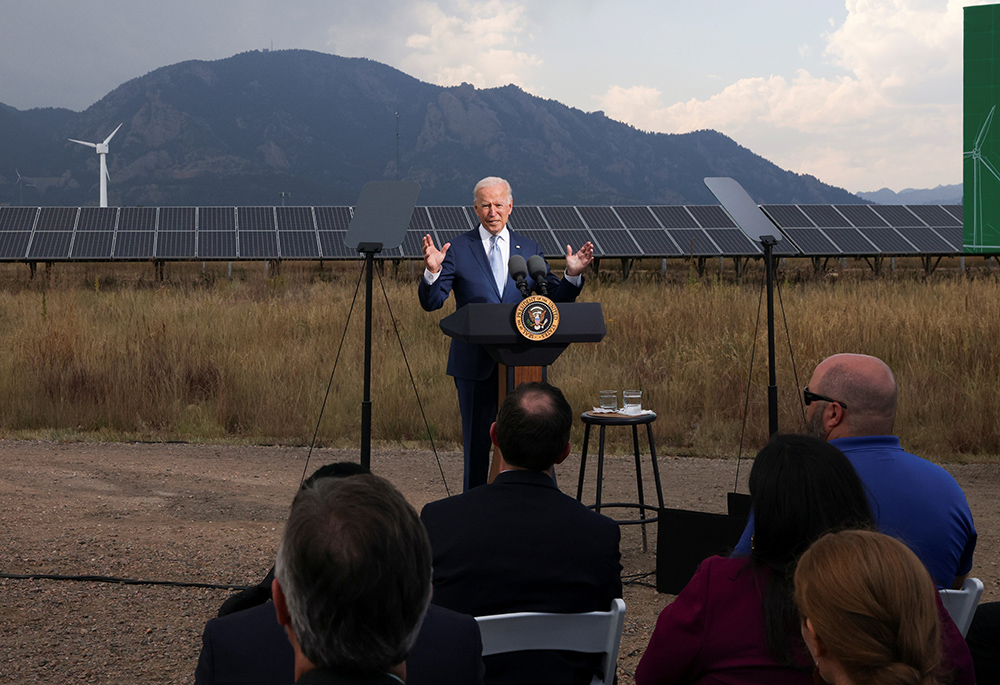
President Joe Biden makes remarks to promote his infrastructure spending proposals during a visit to the Flatirons Campus Laboratories and Offices of the National Renewable Energy Laboratory, Sept. 14, 2021, in Arvada, Colorado. (CNS/Reuters/Leah Millis)
The Pew survey found that more Americans viewed Biden's climate policies as taking the country in the wrong direction (50%) than the right one (45%). Catholics were slightly more supportive (46%) of the second Catholic president's climate efforts.
The survey reflected significant divides between Democrats and Republicans on most of the questions, with Democrats offering greater support to renewable energy expansion and its benefits and Republicans, while still largely supportive of expanded solar (70%) and wind (60%) — though down double digits each from 2020 — more pessimistic about higher energy costs, grid reliability and the benefits of clean energy.
Still, the survey noted divisions among Republicans, with younger and moderate Republicans far less skeptical of a clean energy future, with just 32% of Republicans under 30 foreseeing problems during a transition, compared to 69% of Republicans 65 and older.
While Biden's support remains high among Democrats as a whole, fewer Democrats under 30 (64%) said the president's climate policies were heading in the right direction compared to those 65 and older (87%).
Overall, 69% of Americans said in the past year they have experienced extreme weather at least once in the form of heat waves (45%), floods and intense storms (44%), droughts (33%), major wildfires (18%) or erosion from rising sea levels (16%).
Among those who faced extreme weather, majorities said they believed that climate change contributed to those events.








